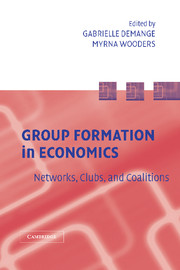Book contents
- Frontmatter
- Contents
- List of Contributors
- Introduction
- PART ONE NETWORK FORMATION, COMMUNICATION, AND LEARNING
- PART TWO ON EQUILIBRIUM FORMATION OF GROUPS: A THEORETICAL ASSESSMENT
- PART THREE GROUPS, CLUBS, ALLIANCES IN POLITICAL AND ECONOMIC ENVIRONMENTS
- 9 Political Parties and Coalition Formation
- 10 Power in the Design of Constitutional Rules
- 11 Group and Network Formation in Industrial Organization: A Survey
- 12 Institution Design for Managing Global Commons: Lessons from Coalition Theory
- 13 Inequality and Growth Clubs
- 14 Informal Insurance, Enforcement Constraints, and Group Formation
- 15 Spontaneous Market Emergence and Social Networks
- Index
11 - Group and Network Formation in Industrial Organization: A Survey
Published online by Cambridge University Press: 02 February 2010
- Frontmatter
- Contents
- List of Contributors
- Introduction
- PART ONE NETWORK FORMATION, COMMUNICATION, AND LEARNING
- PART TWO ON EQUILIBRIUM FORMATION OF GROUPS: A THEORETICAL ASSESSMENT
- PART THREE GROUPS, CLUBS, ALLIANCES IN POLITICAL AND ECONOMIC ENVIRONMENTS
- 9 Political Parties and Coalition Formation
- 10 Power in the Design of Constitutional Rules
- 11 Group and Network Formation in Industrial Organization: A Survey
- 12 Institution Design for Managing Global Commons: Lessons from Coalition Theory
- 13 Inequality and Growth Clubs
- 14 Informal Insurance, Enforcement Constraints, and Group Formation
- 15 Spontaneous Market Emergence and Social Networks
- Index
Summary
Introduction
Recent years have witnessed a surge of interest in the formation of groups and networks in industrial organization. Most of this interest stems from the emergence of new forms of cooperation and competition between firms. The development of strategic alliances, the acceleration in the creation of joint ventures and joint production, and research facilities have given rise to a new strategic environment in which firms cooperate in some domains and compete in others. At the same time, new noncooperative approaches have been introduced in game theory to analyze the endogenous formation of coalitions and networks, providing simple tools that can be applied to study the formation of alliances and networks of firms. These approaches typically model the formation of groups as a two-stage process in which firms initially join in groups or alliances and compete in the market in the second phase.
The objective of this chapter is to provide a selective survey of recent applications of models of group and network formation to industrial organization. Given the abundance of work on the formation of groups of firms (e.g., cartels in oligopolies and bidding rings in auctions), we drastically had to limit the topics covered in the survey. We focus on models that explain the size and structure of groups and networks. Important issues, such as the enforceability of group agreements, the design of mechanisms for cost revelation, or the empirical literature on groups and networks of firms, will not be reviewed in this chapter.
- Type
- Chapter
- Information
- Group Formation in EconomicsNetworks, Clubs, and Coalitions, pp. 335 - 353Publisher: Cambridge University PressPrint publication year: 2005
- 29
- Cited by



